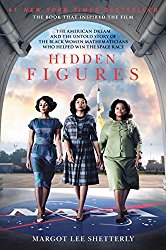
When I first heard about this book, I went through my usual routine to access the book through my overdrive library account. I was delighted to find that the audio book was indeed available, except that I ended up being number 142 for ten copies. Ugh, a long wait indeed. I got impatient, because I was really looking forward to reading this book.
So I ended up going on Amazon and not only purchasing the book but the movie too. I am sooooo glad I read the book before watching the movie. Don’t get me wrong, the movie gets the gist across, and is a good movie in general, but… it does nothing to describe the way these people, these real humans that not only existed but contributed greatly to society, were really like. That’s where the book shined over the movie.
So I read the book, then I watched the movie, and I haven’t stopped talking about either since.
First, I’m extremely upset over this topic. Why? Because in all of my childhood and adult life I had been lead to believe that men dominated the sciences, math, and everything interesting and exciting in life (at least in my opinion). As a woman, I have almost learned to get used to that. Almost.
Then this book comes out, and offers an amazing true history of several black women who not only persevered and overcame, but excelled in their contributions, despite their oppression, and it is thanks to their astounding contributions that our astronauts not only made it out of the earth’s atmosphere, but returned safely back to walk on earth again. That is not a story that everyone can say they have experienced.
I must admit, I tried to imagine their struggles, and put myself in their shoes. These amazing women, who not only had to make difficult choices but live with those choices, had to choose between family and career, between a familiar life or separate segregated bathrooms. Indeed, life’s choices are never easy, but some people rise to the occasion and others fall the wayside. These amazing women clearly did the former.
I thought about what I would do if I were in their situation. I’ve always thought I had an advantage over others because I’ve never been one to follow the crowd, which is both difficult and rewarding. I’ve always been an outcast because of how I think, because I have never conformed to “accepted” stereotypes, because I always thought about things a bit differently, more analytical, and liked to back up my choices with facts.
But these women, wow! I don’t think I could do what they did, nor would I want to experience those hardships. Don’t get me wrong, I would love to say that I was a contributor to beating Sputnik to the moon landing. I would love to say I did the mathematical calculations before calculators existed – calculations which astronauts lives depended upon. But never, would I want to experience such pure racism, at the worst level.
It is one thing to be a black person in a perceived white world, but it is yet another, a much more difficult and challenging one, to be a black woman in a white mans world of science and engineering. Unlike common algebra equations that say two negatives make a positive, this was not the case in our American history, especially when it comes to how people treated other fellow Americans, particularly black female Americans. Yet these women still managed to turn a negative into a positive.
While things have improved a lot in this regard, they are far from perfect. I don’t know why that is, I just know that it is.
I recall how much my heart sank when among a group of scientists, I was one of the few who took a poster project seriously, and my boss could only say “not bad for a woman.” Here I was, an A in calculus, chemistry, biology, nutrition, and all he said was “… for a woman.” As if being female automatically disqualified me from being able to not only be proficient in math, but science. Now, let’s go back several decades, and add to my female self the skin color that is darker than white, and where does that put me? At a disadvantage that I can’t even imagine.
This book is not just about the black women who were literally human calculators who did some of the most important mathematics of American history, but also about the struggles of being a person of a darker skin tone in a day and age when bigotry was accepted, and talent went unappreciated.
Fortunately for these women, their mathematical skills shined through, and a small number of them were given amazing opportunities to change the world. But I’m still angry. What of those who could have contributed so much more, but weren’t allowed due to preconceived stereotypes? How much has our society stagnated because of bigotry? The thought makes my skin crawl and my mind angry.
I won’t lie, in some ways the book isn’t the most engaging, because a lot of it is just plain factual. But the story! It is a history that should be required reading before one can acquire a science based degree in college, if not high school. How is it that so many people today have no idea about this? The importance these women played, and yet, I only discovered this book by chance.
For health,
Tober
Nature's Complement is a participant in the Amazon Services LLC Associates Program, an affiliate advertising program. If you purchase products on Amazon through any of our affiliate links, we get a small percentage of the transaction, at no extra cost to you. We spend a lot of time writing the articles on this site, and all this information is provided free of charge. When you use our affiliate links, you support the writing you enjoy without necessarily buying our products. (However we would appreciate if you would do that too!) Thank you for helping to support our work, however you choose to do so.
These statements have not been evaluated by the Food and Drug Administration. This information and/or products are not intended to diagnose, treat, cure or prevent any disease.


